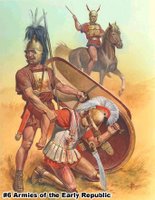 Marius and Sulla were both in some ways a great Roman heroes. However, each also contributed to bringing disaster on Rome.
Marius and Sulla were both in some ways a great Roman heroes. However, each also contributed to bringing disaster on Rome.Please read Plutarch's Life of Marius, either in the abridged version here or the unabridged version here. Then read Plutarch's Life of Sulla, either in the abridged version here or the unabridged version here.
Cite an example that helps build the case that one of these men was a great hero for Rome *or* cite an example that shows how one of these men brought disaster to Rome.
In my opinion, it is much easier to recount the horrors that the men inflicted upon Rome compared to the good they did.
ReplyDeleteIt is easier for me to recount that Marius, in his old age and guided by a prophecy made when he was young, slaughtered thousands (if not hundreds of thousands) of innocent people and took great joy in it. All for the sake of his own ego or to quell his fear of being attacked.
It is easier for me to recall how Sulla also slaughtered many innocents, listing them whenever he wanted (no doubt to amass his fortune as dictator). It is easier for me to recall how he sidestepped the laws when it suited him, displaying behavior that is disturbing at best.
Both of these men, of course, attributed to the rise of Rome's power. Marius had his soldiers carry their own belongings, reforming the army from the makeshift one that was comprised of nobles' sons.
Sylla had Jugurtha delivered to him, delighting in the fame it brought him but maintaining those he worked with or above with the necessities that other soldiers could not get for some reason or another.
Regardless, at least to me, the bad deeds these men performed far outweighs the good in my mind, even if the good maintained long-lasting effects.